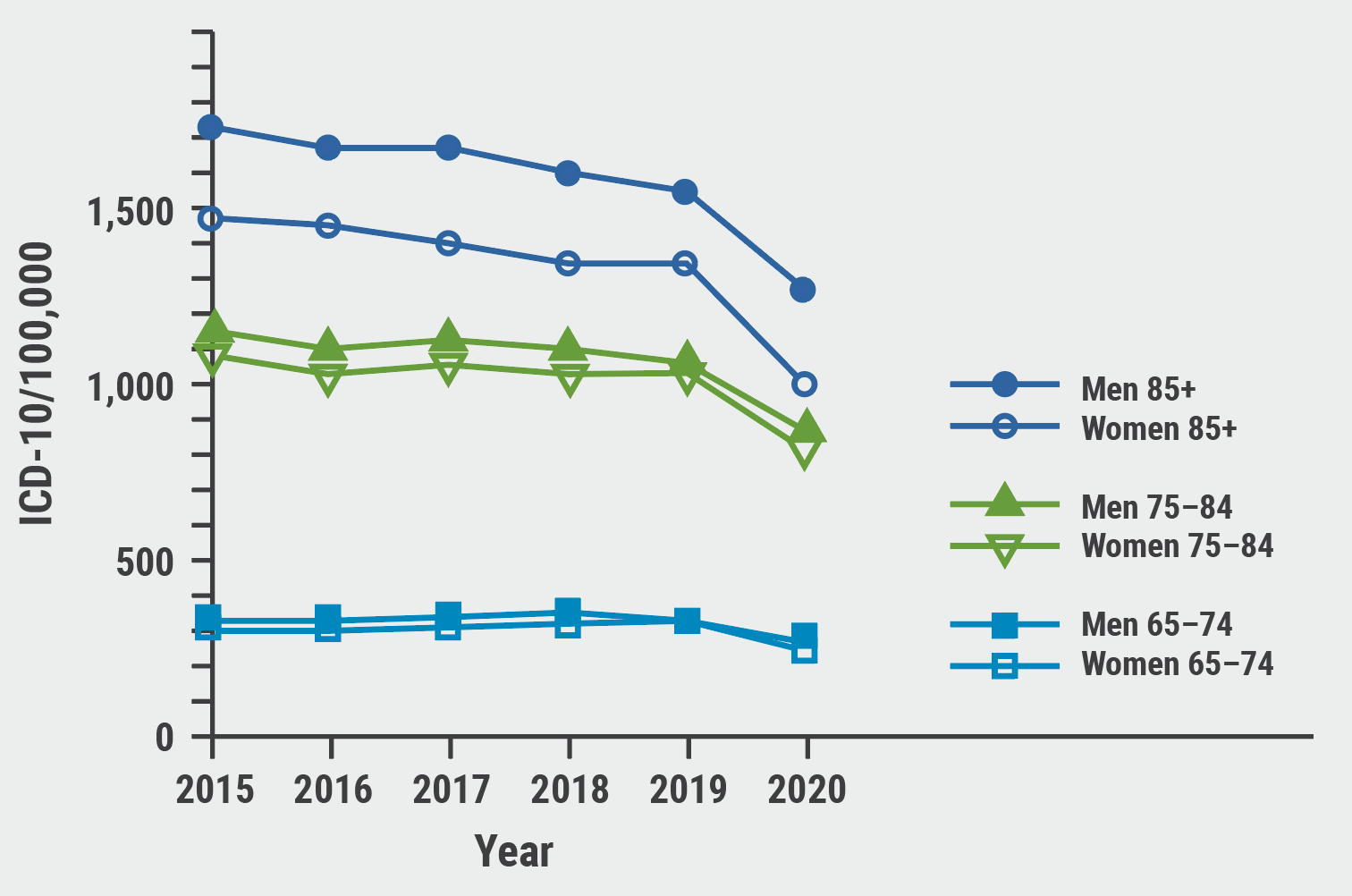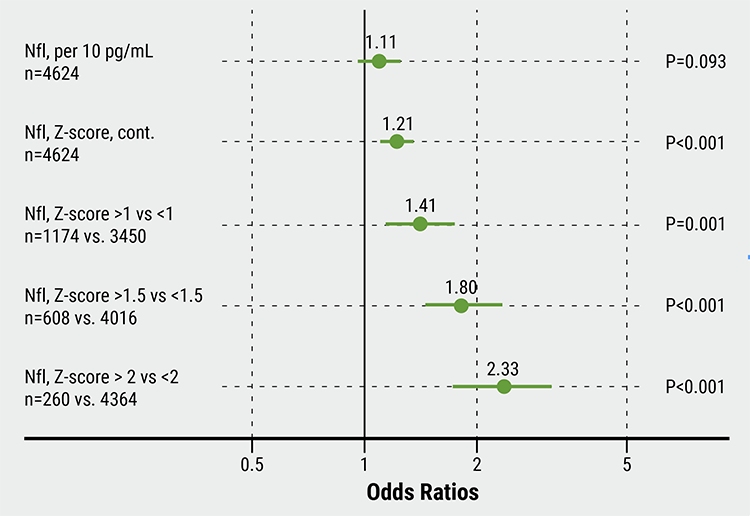https://doi.org/10.55788/bb35dfe8
In the Swedish population of 10.4 million people, around 150,000 have dementia, with 24,000 newly diagnosed patients each year. The number of confirmed cases of COVID-19 is now around 2.5 million; 90% of deaths were in people aged >70 years. To explore the impact of the COVID-19 pandemic on dementia diagnosis and care, Prof. Bengt Winblad (Karolinska Institutet, Sweden) and colleagues collected regional and national data on International Classification of Disease version 10 coding (ICD-10), COVID-19 incidence, mortality, and population census from 2015–2020 from the National Institute of Health and Welfare [1,2].
The incidence of dementia diagnosis was relatively stable during 2015–2019, though already slightly declining, with a further decline in many regions during 2020. This decline was especially steep in women >85 years of age (see Figure). A higher COVID-19 incidence was inversely associated with a decrease in dementia diagnosis incidence. Unspecified dementia was however increased, which may be indicative of decreased quality in dementia diagnosis.
Figure: Changes in dementia diagnoses in Sweden during de COVID-19 pandemic [1,2]

Reprinted from Axenhus M, et al. BMC Geriatr. 2022;22(1):365. DOI 10.1186/s12877-022-03070-y under the terms of the Creative Commons Attribution 4.0 license.
During the first 6 months of 2020, mortality was 4.82% higher than would be expected without the COVID-19 pandemic (n=18,940 vs n=18,452). Excess mortality was 8.61% in men and -0.58% in women with dementia. These rates were higher in patients with Alzheimer’s disease.
This study thus showed that the need for dementia diagnosis is crucial and that the COVID-19 pandemic further highlighted this.
- Winblad B, et al. The COVID-19 pandemic has caused large disruptions to dementia mortality, care, and diagnosis in Sweden during 2020. OPR-036, EAN 2022, 25–28 April, Vienna, Austria.
- Axenhus M, et al. BMC Geriatr. 2022;22(1):365.
Copyright ©2022 Medicom Medical Publishers
Posted on
Previous Article
« Seizure forecasting with non- and minimally-invasive devices Next Article
AstraZeneca vaccination and risk of cerebral venous sinus thrombosis »
« Seizure forecasting with non- and minimally-invasive devices Next Article
AstraZeneca vaccination and risk of cerebral venous sinus thrombosis »
Table of Contents: EAN 2022
Featured articles
Letter from the Editor
Overarching Theme
Migraine
Targeting cortical activation by transcranial magnetic stimulation
Erenumab more than doubles plasma CGRP levels
Over a third of patients responds late to CGRP antibodies
Multiple Sclerosis
When to start, switch, and stop MS therapy: Real-world evidence counts
Updated EAN-ECTRIMS guideline on pharmacological MS treatment
Gut microbiota composition associated with disability worsening
Teriflunomide in children with MS: final results of TERIKIDS
Estimating brain age in MS: machine learning versus deep learning
Ofatumumab improves cognitive processing speed
Parkinson’s Disease
Intestinal alterations in patients with Parkinson’s disease
Gene variants impact survival in monogenic Parkinson’s disease
Cerebrovascular Disease and Stroke
Most acute stroke patients have undiagnosed risk factors
Absence of Susceptibility Vessel Sign points to malignancy in stroke patients
Acute stroke management: from time window to tissue window?
Epilepsy
Seizure forecasting with non- and minimally-invasive devices
Real-world efficacy of cenobamate in focal-onset seizures
Possible new biomarker for early neuronal death in mesial temporal lobe epilepsy
COVID-19
COVID-19 elevates risk of neurodegenerative disorders
More headaches in adolescents during COVID-19 pandemic
AstraZeneca vaccination and risk of cerebral venous sinus thrombosis
Large impact of COVID-19 on dementia diagnosis and care
Miscellaneous
Tau autoimmunity associated with systemic disease
Long-term effects of avalglucosidase alfa in late-onset Pompe disease
European survey of patient satisfaction in the treatment of cancer-related neuropathic pain
Related Articles
August 22, 2022
Most acute stroke patients have undiagnosed risk factors

November 25, 2020
Serum NfL as biomarker for suboptimal treatment response
© 2024 Medicom Medical Publishers. All rights reserved. Terms and Conditions | Privacy Policy
HEAD OFFICE
Laarderhoogtweg 25
1101 EB Amsterdam
The Netherlands
T: +31 85 4012 560
E: publishers@medicom-publishers.com

